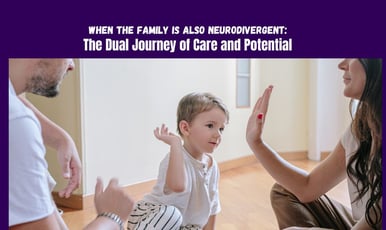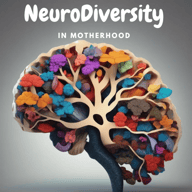When the Family is Also Neurodivergent: The Dual Journey of Care and Potential


Motherhood is complex, and for a parent of a neurodivergent child, the journey gains layers of profound challenges and discoveries. But what happens when the parent (or the other parent, or both) is also neurodivergent? This is a dual journey – a deep dive into self-understanding, celebrating unique superpowers, and managing specific challenges. The crucial point is that a profound understanding of yourself and your neurodivergent family unit becomes the compass for everyone's success.
Many neurodivergent parents with autism, ADHD, or other neurodiversity report constant sensory overload, a striking difficulty managing time, and the countless demands of parenting. The chaos, noise, disorganisation, and unpredictability inherent in raising children can be exhausting, amplifying the characteristics of parental neurodiversity. However, it's fundamental that you understand that these challenges aren't deficiencies. They are simply characteristics of a different brain operating system. And that system, with the right strategies and focus, can be optimised for excellence.
Your Neurodiversity as a Strategic Superpower
Neuroplasticity is the incredible capacity of the brain to adapt and change. This is your most significant leverage, especially in your neurodivergent child's early childhood. Early interventions aren't just "helpful" but critical and revolutionary for maximising developmental potential. Don't underestimate the exponential impact of every small, focused, and intensive intervention. Neurodivergent children in early and middle childhood have immense learning and adaptation potential, and you, as a parent with your neurodiversity, are uniquely positioned to nurture this. Don't wait for therapy results; implement effective strategies at home today!
As parents, we tend to feel overwhelmed by daily tasks and, at times, procrastinate on implementing effective strategies. This is a pattern that needs to be broken. Think of this as a race against biological time – every day, every hour, every intervention focused on the window of neuroplasticity counts. You can think about systems and root causes. Instead of putting out fires with superficial solutions, identify the triggers and the roots of the challenges and develop systemic, proactive, and lasting solutions. This will make the difference from early childhood through middle childhood and into adolescence.
High-Impact Frameworks for the Neurodivergent Family
For the neurodivergent parent and family, organisation, predictability, and intelligent delegation aren't luxuries but fundamental necessities for survival and flourishing. Here are some practical frameworks and mental models to boost your efficiency and well-being, directly applicable to your difficulties in managing time and sensory overload:
"Atypical Delegation and Automation System" (ADAS): Parents, especially neurodivergent ones, tend to over-analyse "everything" and may want to centralise "everything." This is disguised self-sabotage. Use tools like Trello to list tasks and explicitly delegate responsibilities to your partner or support network. Create visual and auditory routine templates for daily and weekly tasks that can be automated or carried out by other family members. Think: "Who else can do this? How can I make this a continuous process independent of my daily energy?" This frees you up for high-value interventions like learning or implementing effective strategies with your child.
"Family Sensory Overload Filter and Management" (FSOFM): Identify the biggest sensory triggers for you and your child. This could include noise, textures, odours, lighting, or chaotic environments. Create "decompression zones" or "sensory sanctuaries" in your home. Use noise-cancelling headphones, wear comfortable clothes for yourself and your child, and minimise visual clutter. Prioritise silence, simplicity, and sensory calm whenever possible. Educate your partner and family about the importance of this for everyone's emotional well-being.
"Neuroplasticity-Focused Reverse Outcome Planning" (NF-ROP): Instead of starting with a to-do list, begin with the desired developmental outcome for your child. For example: "I want my child to develop X social skill," or "I want my child to have a consistent sleep routine to optimise their neuroplasticity." Now, work backwards: "What daily or weekly interventions do my partner and I need to do to make this happen?" This forces a proactive and intensely impact-oriented mindset.
"Continuous Family Feedback and Optimisation Cycle" (CFFOC): Given your capacity for analysis, apply a constant feedback cycle to your family dynamics. Weekly, please take a look at what worked and what didn't. Be brutally honest with yourself and your partner. Where did you give in to procrastination? Where could responsibilities have been better divided? Where could the intervention have been more focused, intense, and early? Use these insights to adjust and optimise your strategies continuously.
Your mind is an extraordinary tool. The negative motherhood memories, the moments of overload and comparison, aren't a testament to your failures. On the contrary, they are a detailed map of where you can grow and optimise. It's time to stop underestimating your potential and the potential of your neurodivergent family. Emotional well-being in atypical motherhood isn't a distant ideal; it's the direct consequence of daily effort and strategic and focused action nurtured by your unique individuality as a neurodivergent family.
STRENGTH, FAITH, and abundant FOCUS!
References:
Grandin, T. (2013). The Autistic Brain: Thinking Across the Spectrum. Houghton Mifflin Harcourt.
Hallowell, E. M., & Ratey, J. J. (2010). Driven to Distraction (Revised): Recognising and Coping with Attention Deficit Disorder from Childhood Through Adulthood. Pantheon.
Siegel, D. J., & Bryson, T. P. (2011). The Whole-Brain Child: 12 Revolutionary Strategies to Nurture Your Child's Developing Mind. Delacorte Press.
Neff, K. (2011). Self-Compassion: The Proven Power of Being Kind to Yourself. William Morrow.
Wolff, S. (2017). The Woman with the Flying Brain: A Mother and Daughter's Journey with Autism. Jessica Kingsley Publishers.
